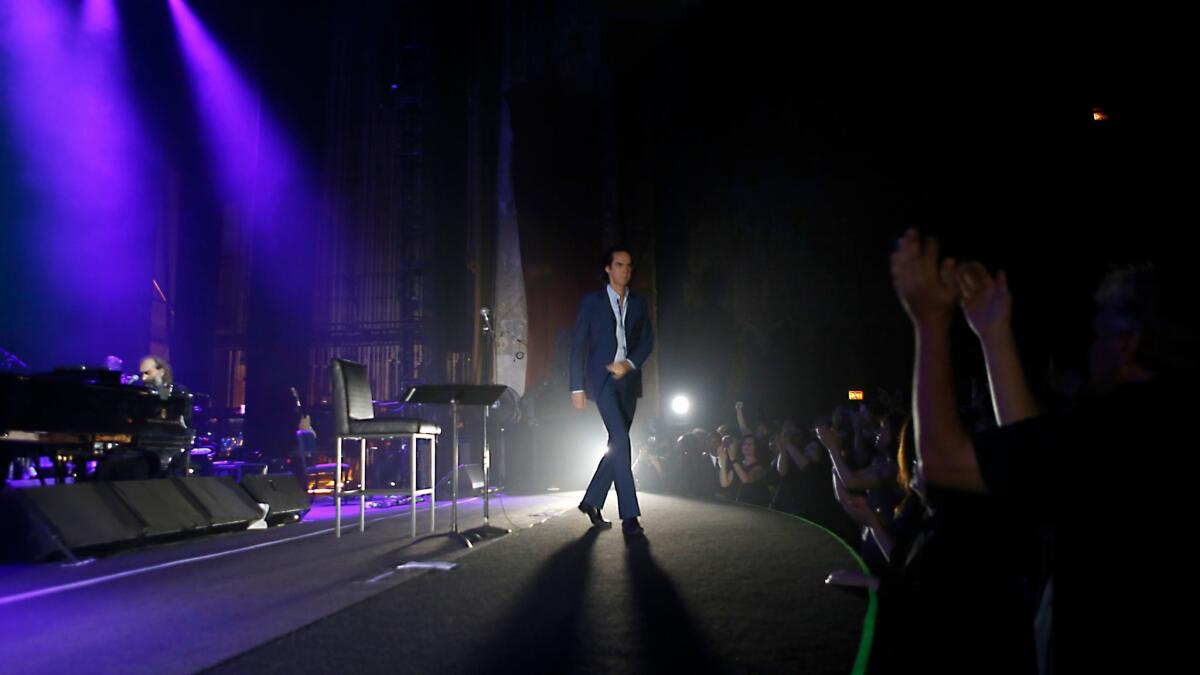Review: Nick Cave, a conjurer of a sonic tempest at the Ace

- Share via
To begin his performance at the Theatre at Ace Hotel, Nick Cave slowly sauntered onstage, elegantly waved his arms like a conductor and then took a seat.
Over the next two hours, Cave would transform, multiple times, from orator to preacher to savior to conjurer of a sonic tempest. Though seated, Cave was full of slow-motion movement Wednesday night, letting his hand rise and fall as if constructing an imaginary painting, his brushstrokes accentuating the slow-trickling piano and choir-like backing harmonies.
Opening number “Anthrocene,” taken from the stark and harrowing mediation on love, loss and grief that is “Skeleton Tree,” Cave’s 2016 album with his long-standing band the Bad Seeds, was the calm before the eruption.
The song’s final line — “Close your eyes little world, and brace yourself” — could be taken a number of ways. A warning for the exorcism of pain that would follow in concert? A plea to dream? Or battle prep, one that acknowledged the endurance of the human spirit in the face of adversity of biblical proportions?
Cave and the Bad Seeds touched on all the above; there was murder, bloodshed, weeping and betrayal in these songs, many of which explored the tension between control and the furious abandonment of it. And yet there was hope, and an unfettered adoration and belief in the ideals of romantic love.
“One more time with feeling,” Cave sang — growled, rather — on “Magneto,” a song given a far more combustible reading live than on record. At the Ace, Cave leaped often into the crowd, holding tight to the outstretched hands of audience members during the song’s repetitive refrain of “in love, in love, I love, you love,” and then sneering the word “feeling” so it almost sounded as if he were saying “fear.”
As lyrical images flashed by — some violent, some remarking on the mundane blues of supermarket queues — the overwhelming sense was the need for passion. Such longing for emotional intensity is paramount in a concert with Cave and the Bad Seeds.
Even the band’s furiously savage take on “Stagger Lee” was tempered by the desire for a communal connection, as Cage invited the first few rows of concertgoers onstage and then maneuvered through the thick like the devil orchestrating the chaos in “Fantasia’s” animated reading of “Night on Bald Mountain.”
Cave in fact relied as much on the audience as he did his band. In songs where peril was most present, it wasn’t uncommon for Cave to stand at the foot of the stage and gently wave the audience closer and whisper to those within earshot.
On the turbulent “Higgs Boson Blues,” where a solo electric guitar gave way to a calamity of noise and then crawled back to a hymn, Cave referenced the “boom, boom, boom” of his heartbeat as he thrust the hands of those nearby onto his chest. Between songs, Cave was ever gracious, as if to remind us all that this was a performance, but also to set some boundaries for this intimacy. He denied, for instance, a fan’s request to relinquish his sweat-covered towel.
There was plenty of discord, darkness and even spookiness. On the riveting “Tupelo,” Martyn Casey’s crawling bass had a tone of scraping at wood, but before it was all over, the song would swell to pure pandemonium, with ace multi-instrumentalist Warren Ellis flailing at a violin held high above his head.
On “Jesus Alone,” Ellis, now on synthesizer, concocted serpent-like twists. And whenever rhythm-maker Jim Sclavunos surprised with church-like bells, the themes of sin and redemption would swell to the surface.
What persevered, however, was that beneath all this catharsis was the steadfast belief in one’s own resolve. On “Jubilee Street,” Cave fearlessly danced to the effervescent, galloping piano of Larry Mullins, and on “Distant Sky” Danish singer Else Torp appeared via video to provide a soothing, angelic counterpoint to Cave’s cynicism.
Set-closer “Skeleton True” proved to be even more sanguine. Downtrodden on record, live it became a swaying singalong, with the ending refrain, “and it’s alright now,” bringing the pre-encore show to an end. All the disorder of the night suddenly vanished as bleakness gave way to something brighter.
Follow me on Twitter: @toddmartens
More to Read
The biggest entertainment stories
Get our big stories about Hollywood, film, television, music, arts, culture and more right in your inbox as soon as they publish.
You may occasionally receive promotional content from the Los Angeles Times.











